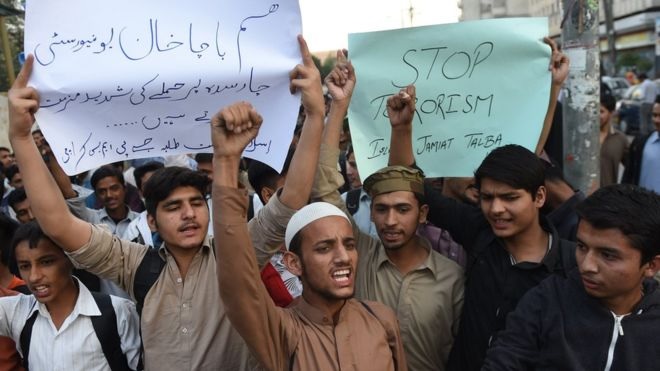By M Ilyas Khan
People in Pakistan woke up on Wednesday to yet another devastating attack on an educational institution in the Peshawar valley region. This time, the death toll was lower than that seen in the December 2014 attack on Peshawar’s Army Public School (APS), though at least 19 innocent lives were lost.
The area where the attack took place is located close the tribal region of Mohmand where a strong force of native militants has been operating, its control of territory waxing and waning with the fluctuating intensity of military operations. While their control of territory has shrunk considerably, their fighters still have access to ‘safe-houses’ in the valley where they can feed and rest before embarking on a mission.
Investigations into the APS attack last year led to the arrest of men who ran such ‘safe-houses’ in Peshawar and its outskirts, hosting the attackers and providing them with food and transport.
Gunfire, explosions and stampedes
Likewise, officials believe the militants who stormed the Bacha Khan University campus on Wednesday morning probably walked out of a similar safe-house in the area and, under cover of thick fog, scaled the back wall of the sprawling campus to launch the attack. TV pictures showed anxious relatives crowding the area around the front gate of the university, searching for information about the fate of their children.
Students who came out through the gate spoke of gunfire, explosions and stampedes. Many in the three hostels on the campus said they locked themselves in their rooms. Others hid in the bathrooms or latched up their classroom doors.
But most of them were herded out of the compound safely by the university’s security guards who were apparently aided by the fog, which gave them an advantage over the attackers due to their better knowledge of the premises. The local police also arrived promptly on the scene, and helped confine the attackers to a couple of blocks on the premises. They were soon joined by the army.
Spike in attacks
However that did not stop alarm spreading rapidly across the country, with frustrated voices raising questions over the army’s claims to have dismantled the militant infrastructure.
“Those who said 2016 was the year of the end of militancy should explain these attacks,” well-known Geo TV talk-show host Hamid Mir commented, without naming army chief Gen Raheel Sharif who had made these remarks recently.
Why can’t Pakistan stop the militants?and are able to share resources. And they have access to funds and weapons. Some in the Pakistani establishment blame India for picking up their bills, while others blame elements in the Afghan government. Delhi and Kabul have routinely denied such accusations in the past.
Continued militancy
But ethnic Pashtun nationalists – who inhabit the north-western region – and many political groups in Sindh and Balochistan provinces in the south, believe the fault lies with the selective nature of Pakistan’s own action against militants. “Militant attacks have continued because we failed to fully implement the national action plan (NAP) that was drawn up in the aftermath of the APS attack,” Mian Iftikhar Hussain, a former minister of Khyber Pakhtunkhwa province and a leader of the nationalist ANP party, said in comments aired on TV.
he 20-point NAP, which was drawn up unanimously by the country’s political and military leadership, claimed that “no armed militants (would be) allowed to function” in the country, and that the government would “ensure against the re-emergence of proscribed organisations (under new names)”. But there have been questions over the continued existence of groups like Lashkar-e-Taiba and Jaish-e-Mohammad under different names, and over recurrent reports that Afghan Taliban continue to use Quetta (as well as Peshawar and Karachi) as their command-and-control centres. These groups in turn share resources with Pakistani Taliban, whom Islamabad wants to eliminate but who have now either melted into groups allegedly supported by Pakistan or spread across inaccessible areas along the Afghan border’s northern stretches – but still within striking range of Peshawar valley region.
‘Quid pro quo’
Many believe the problem requires a regional solution. They say Pakistan should single-mindedly move against militants focused on India and Afghanistan, and in return call for these countries to help block funding for Pakistan-focused groups and prevent them finding sanctuary. “It’s all down to a quid pro quo now,” one ANP leader tells me in confidence. “If not, then as (US President Barack) Obama said in his state of the union address, Pakistan will continue to remain unstable for several decades.”
‘Courtesy BBC News’.


